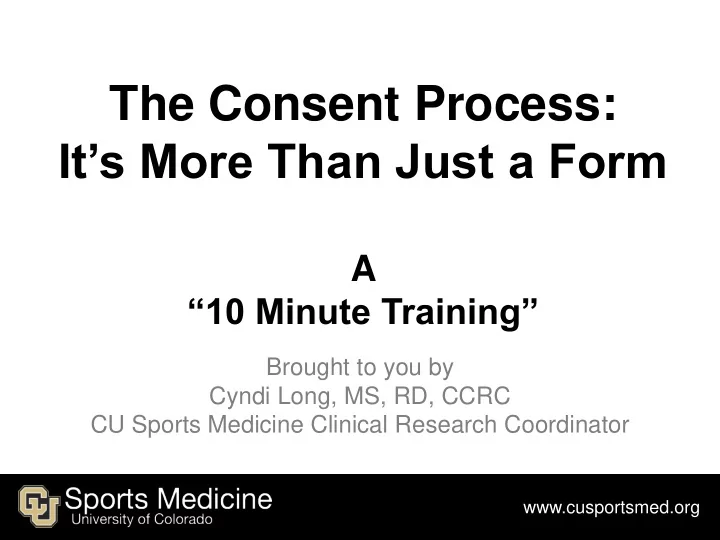

The Consent Process: It’s More Than Just a Form A “10 Minute Training” Brought to you by Cyndi Long, MS, RD, CCRC CU Sports Medicine Clinical Research Coordinator www.cusportsmed.org
Introduction Training Goal: • All research team members are knowledgeable about the process of obtaining and documenting informed consent for study participation. • Informed consent is obtained in compliance with OHRP, FDA, IRB, and ICH guidelines for Good Clinical Practice. Performance Objectives: At the end of this training session you will know Who, What, When, Why, and How to carry out the informed consent process. www.cusportsmed.org
Definition “Informed consent is a vital part of the research process, and as such entails more than obtaining a signature on a form. Investigators must educate potential subjects to ensure that they can reach a truly informed decision about whether or not to participate in the research. Their informed consent must be given freely, without coercion, and must be based on a clear understanding of what participation involves .”* The documentation of informed consent ( i.e. , signing of the consent form) is also a vital part of the research process. *Partners Healthcare: Founded by Brigham & Women’s Hospital & Massachusetts General Hospital www.cusportsmed.org
Ethical Principles - Why • Nuremburg Code : “The voluntary consent of the human subject is absolutely essential”. This means that the person involved should have legal capacity to give consent, without any intervention of deceit or coercion; and should have sufficient knowledge and comprehension of the subject matter. (Nuremburg Code, 1949) • Declaration of Helsinki : “…the well -being of the individual research subject must take precedence over all other interests.” (Declaration of Helsinki, 1964) • Belmont Report : “…respect for persons demands that subjects enter into the research voluntarily and with adequate information.” (The Belmont Report, February 1976) www.cusportsmed.org
The Informed Consent Process - Who Who Must be Consented ? • Potential subjects who are thought to fulfill the inclusion/exclusion criteria for the study. Who May Obtain Consent? • Qualified research team members trained in Human Subject Protection & with sufficient knowledge about the specific study. This may include the Principal Investigator (PI), sub- investigators, research coordinators or other research team member approved by the IRB. • Though the PI may delegate obtaining consent to other team members, proper oversight and execution is always the PI’s responsibility. www.cusportsmed.org
The Informed Consent Process - What 8 Required Elements of Informed Consent: Research – statement that study involves research, its purpose, 1. duration, procedures, & identification of experimental procedures. 2. Risks - or discomforts, that are reasonably foreseeable. Benefits – to subject or others, that are reasonably expected. 3. 4. Alternative - procedures or treatments available, if any. 5. Confidentiality - of records identifying subject, though may be inspected by authorized entities ( i.e. , FDA, IRB, UCD/UCH, Sponsor) . Research-Related Injury – available treatment & compensation 6. (if study is greater than minimal risk). Contact – person for questions regarding the study, subject’s 7. rights, or research-related injury. Voluntary – no penalty or loss of benefits for choosing not to 8. participate & may discontinue at any time. FDA 21 CFR 50.25 & 45 CFR 46.116 www.cusportsmed.org
The Informed Consent Process - What Additional Elements of Informed Consent: Unforeseeable Risks – may be involved . 1. Participation Termination – circumstances under which PI 2. may terminate subjects participation without their consent. Additional Costs – to subject due to participation. 3. Withdrawal – consequences of subject’s decision to withdraw 4. & withdrawal procedures. Significant New Findings – subjects will be notified of new 5. findings which develop during the course of research that may relate to their willingness to continue participation. Subject Numbers – approximate number involved in study. 6. The 8 basic elements are required in all consents. Additional elements are used when appropriate and as required by IRBs. They are typically incorporated in the IRB templates with instruction for use. www.cusportsmed.org
The Informed Consent Process - When Informed consent must be obtained: • Prior to conducting any study related tests, procedures, treatments, or questionnaires. • Using the current IRB approved consent form (HRRC approval is also required prior to consenting any subjects if using UCH facilities). • Re-consent is required if there is new information that would effect the subjects willingness to continue participation or as directed by the IRB. www.cusportsmed.org
The Informed Consent Process - How • Identify potential study participants based on study criteria. • Describe the study verbally, as outlined in the approved consent, using non-technical language. An interpreter should be involved if necessary. • Invite questions and ensure all are answered satisfactorily. • Allow time to review the consent alone or with physician, family or friends if desired. • Assess understanding of the major elements of the consent. • If there is voluntarily agreement to participate, obtain signature, initials where indicated, and date from the subject. • Consenter must also sign and date, as must the PI if there is a PI signature line on the consent form. • Provide a copy to the subject and maintain the original in the subject’s study file. • Complete the Consent Process Documentation form & file. www.cusportsmed.org
Summary • Consent is an ethical obligation governed by federal regulation, which requires the use of current IRB approved consent forms. • Consent must be informed and voluntary. • Consent must be completed prior to any study-related activity. • Documentation of the consent process (by signing the consent form) is required for most studies. • Obtaining consent may be delegated to trained research team members, but is always the PI’s responsibility. Consent is a Process – Not just a Form! • 3/28/2013 www.cusportsmed.org
Recommend
More recommend